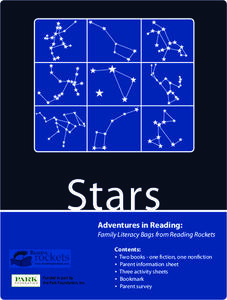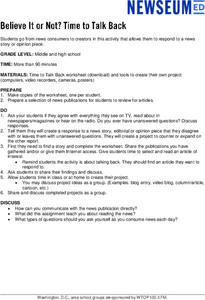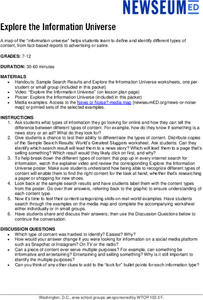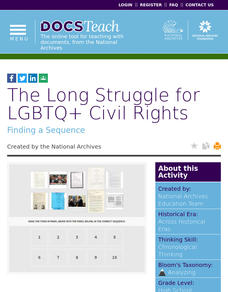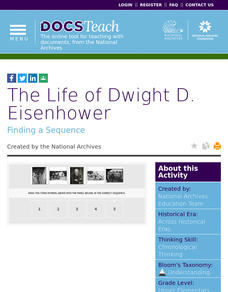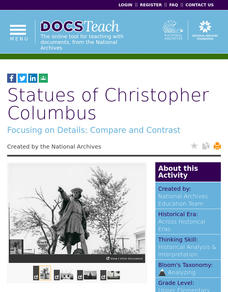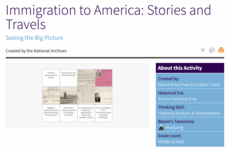PBS
Reading Adventure Pack: Heroes
Three creative activities follow reading a fiction and nonfiction book about heroes. Scholars build hero action figures out of clay for make-believe play, explain in written form how they show bravery, kindness, patience, thoughtfulness,...
PBS
Reading Adventure Pack: Bees
A Reading Adventure pack explores the busy life of bees. After reading a fiction and nonfiction text, scholars complete three hands-on activities. Participants invent a robot that can do the work of bees, cheers to hardworking bees with...
PBS
Reading Adventure Pack: Stars
A Reading Adventure Pack explores the night sky. Reading Her Seven Brothers by Paul Goble and Find the Constellations by H.A. Rey begin the learning experience. Scholars craft a night sky mobile, go stargazing, and write a mythical story...
Newseum
Believe It or Not? Time to Talk Back
Young journalists select a news story, editorial, or opinion piece that they disagree with or one that leaves them with questions. They then create their report in response and share it with the class.
Newseum
Explore the Information Universe
Distinguishing among different types of content when conducting online searches can be a challenge. An informative resource helps researchers identify different types of content, from fact-based reports to ads, from propaganda to satire....
British Council
Buy. Use. Toss.
Responsible consumption is never a waste of time. Using the engaging resource, scholars learn about the impact of waste on the planet, sorting trash into necessary and luxury piles. They then analyze their consumption habits, writing an...
Bonneville
Informative Writing: Where Does Energy Come From?
Get energized about all the different sources of energy. A research project has scholars investigate a renewable or non-renewable energy type of their choice. They write a report on their findings and decide on a way to publish their work.
Center for History Education
U.S. Foreign Policy and the Iran-Contra Affair: Was Oliver North a Patriot, a Pawn, or an Outlaw?
If you had to write a song about Oliver North, would it be a ballad or a dirge? If you had to put him on a trading card, would he be a hero or the bad guy? Young historians decide for themselves after examining documents from the...
DocsTeach
Uncle Sam and the American Diet
Uncle Sam wants you to follow the food pyramid! Scholars analyze two images of propaganda posters the government created to promote the food pyramid. Academics complete a worksheet to understand the impact of the campaign and end the...
DocsTeach
The Long Struggle for LGBTQ+ Civil Rights
Academics analyze 10 primary documents and photos to create a timeline of the LQBTQ+ movement. The activity includes an online worksheet. Scholars also participate in a group discussion to understand the long struggle the LGBTQ+...
DocsTeach
The Life of Dwight D. Eisenhower
A captivating activity uses images to help pupils understand the life of President Eisenhower. Scholars put the images in chronological order and read the captions to get a better understanding of the war hero turned president.
DocsTeach
The 19th Amendment and the Road to Universal Suffrage
Your vote matters! An informative activity focuses on the Nineteenth Amendment and explains how it paved the way for universal voting rights. Young historians analyze several documents and a complete a worksheet, describing the impact of...
DocsTeach
Statues of Christopher Columbus
Scholars compare statues of Columbus and discuss how each memorial captures his personality. Academics also complete a worksheet and discuss how some people have called to remove statues honoring Columbus.
DocsTeach
Memorials, Statues, and Monuments to George Washington
An activity uses images of George Washington's statues to compare how they represent different aspects of his life. Scholars complete a worksheet based on their findings and then share as a group how they would construct a new memorial...
DocsTeach
Memorializing Abraham Lincoln in Washington, DC
The legacy of President Lincoln continues to endure. Scholars view images of three statues that have been created to honor President Lincoln. Academics analyze the three images and share their findings in a group discussion format. Young...
DocsTeach
Immigration to America: Stories and Travels
An eye-opening activity uses documents and photos to help academics understand the factors that pushed or pulled immigrants to America. Young historians group photos based on a push or pull factor, then complete a worksheet. Scholars...
Center for History Education
Cold War Case Files: The Rosenberg Trial - Was Justice Fairly Served?
The Rosenbergs—executed for their role in a Soviet-era spy ring—continue the captivate the American imagination. Using a history lab format, young historians examine the trove of documents associated with the case, including photographs...
Center for History Education
To What Extent Were Women's Contributions to World War II Industries Valued?
Women rose to the challenge when the nation's war effort called them—but were sent home when the GIs came back from World War II. Young historians consider whether the United States valued women's contributions during the war using a...
DocsTeach
How Have Americans Responded to Immigration?
While America says it welcomes from other countries the tired and poor yearning to be free, the record is mixed on whether there has been a warm reception for immigrants. Class members use an interactive graphic scale and primary source...
Center for History Education
Guatemalan Coup of 1954: How Did the Cold War Influence American Foreign Policy Decisions?
Was it all about the bananas—or the fear of a communist threat? Young historians use a history lab to examine documents from the American-led 1954 Guatemalan coup. Using graphics, government documents, and speeches, they examine the...
Newseum
Journalists Code of Ethics
Journalists are supposed to adhere to a Code of Ethics. To determine the degree to which reporters follow this code, individuals select three recent stories with photographs from newspapers, magazines, online news sites, or television...
Newseum
Disinformation Nation: Separating Politics and Propaganda
Separating political rhetoric from propaganda is no small feat. Class members are challenged to examine two different sources about a candidate in an upcoming election and determine whether the primary purpose of the source is to inform...
Newseum
Reporting Part III: Staying Objective
The third and final lesson in the Reporting series tests young journalists' ability to be objective in reporting contentious topics. After brainstorming a list of contentious topics that interest them, the class selects one, and...
Newseum
Reporting Part II: Beyond the Basics
Scholars examine the articles written for the series' first lesson and select ones that would benefit from further research. In a 48-hour deadline, teams of three select one topic to investigate in greater depth and craft a revised...




